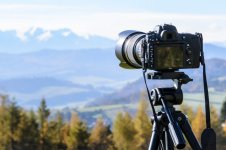When it comes to photography, there are many tools and accessories that can enhance your skills and help you capture stunning images. One such accessory that often comes into question is the camera tripod. A tripod is a three-legged stand designed to provide stability and support to your camera. In this blog post, we will explore the benefits of using a camera tripod and help you determine whether it is an essential tool for your photography needs.

While a camera tripod offers numerous benefits, it's important to consider a few factors before deciding if it's necessary for your photography needs:
While a camera tripod is not an absolute necessity for every photography situation, it can significantly enhance your image quality, compositional control, and creative possibilities. It provides stability, sharpness, and allows for precise framing, making it an indispensable tool for certain genres like landscape, macro, and long exposure photography. Evaluate your shooting style, requirements, and budget to determine whether a camera tripod is a worthwhile investment for your photographic journey.
- Stability and Image Sharpness: One of the primary advantages of using a camera tripod is the stability it offers. By keeping your camera steady, it eliminates the risk of camera shake, resulting in sharper and clearer images. This is particularly beneficial in low-light situations or when using slower shutter speeds. With a tripod, you can take long exposure shots, capture intricate details, and achieve better overall image quality.
- Composition and Framing: A tripod allows photographers to compose and frame their shots with precision. It provides a stable platform, enabling you to take your time and carefully consider the composition, angles, and perspective. By using a tripod, you can experiment with different compositions, adjust the height, and capture images from unique viewpoints that would otherwise be challenging to achieve handheld.
- Low-Light and Night Photography: In low-light conditions or during night photography, the lack of sufficient light can lead to longer exposure times. Holding the camera steady for extended periods can be difficult, resulting in blurry images. A tripod becomes invaluable in such situations, allowing you to capture stunning nightscapes, star trails, and light painting with ease.
- Macro and Close-Up Photography: When capturing intricate details in macro or close-up photography, even the slightest movement can cause blurriness. A tripod offers the stability required for precise focusing and intricate compositions. It allows you to adjust the camera position gradually and achieve the desired depth of field. In this genre of photography, a tripod can make a significant difference in the quality of your images.
- Self-Portraits and Long Exposures: If you enjoy self-portraiture or want to be part of the shot, a tripod can be an invaluable tool. By using a timer or a remote shutter release, you can set up the camera on the tripod, frame the shot, and ensure you are perfectly positioned within the frame. Moreover, for long exposure photography, where a steady camera is a must, a tripod is essential to capture the desired effects, such as light trails or smooth water.
While a camera tripod offers numerous benefits, it's important to consider a few factors before deciding if it's necessary for your photography needs:
- Portability and Convenience: Tripods come in various sizes and weights. Consider whether you are comfortable carrying a tripod with you on your photography expeditions or if portability is a priority. If you frequently shoot in dynamic environments or travel extensively, you might need to explore more compact and lightweight tripod options.
- Shooting Style and Genres: Different photography genres have specific requirements. If you primarily shoot action sports or street photography where mobility and quick setups are crucial, you may not rely heavily on a tripod. However, for landscape, architectural, or studio photography, a tripod is often considered an essential tool.
- Budget and Alternatives: Tripods can vary in price depending on their build quality, materials, and features. Consider your budget and explore alternatives such as monopods or mini tripods, which can provide some stability while being more compact and affordable.
While a camera tripod is not an absolute necessity for every photography situation, it can significantly enhance your image quality, compositional control, and creative possibilities. It provides stability, sharpness, and allows for precise framing, making it an indispensable tool for certain genres like landscape, macro, and long exposure photography. Evaluate your shooting style, requirements, and budget to determine whether a camera tripod is a worthwhile investment for your photographic journey.
